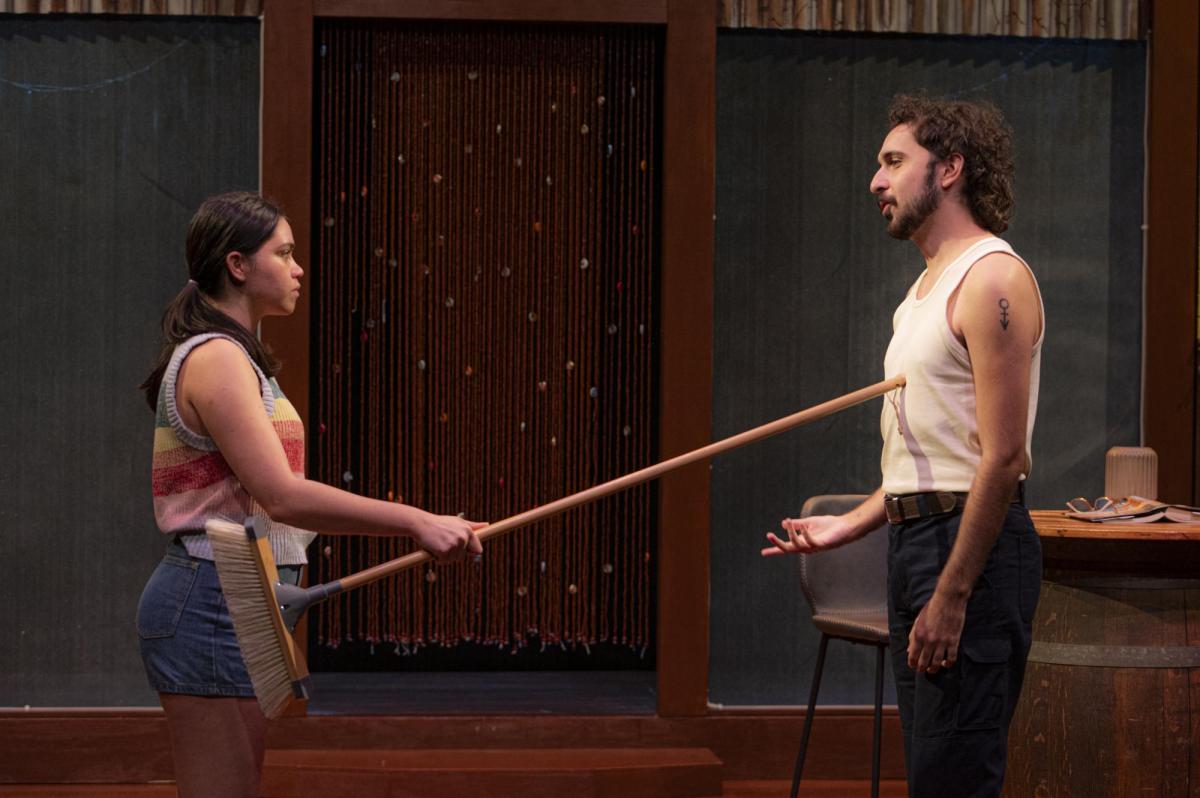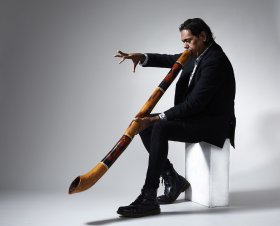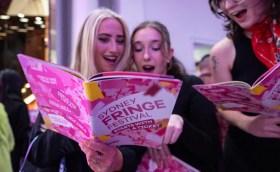When my father died, he left me the house in Lower Flügelhorn where I’d grown up and lived for most of my childhood and teenage years. In the meantime, I’d moved out, gone to university in Vienna and the UK, and finally emigrated to Australia. It took me five years to decide what to do, including three years when I moved back, renovated the house and experimented with living there again. In the end – after a lot of guilt, anxiety and soul-searching about where I really wanted to be – I sold up and moved back to Australia.
Gija Yarawu playwright Barbara Hostalek’s Thirst is about two women faced with similar decisions. Lola is a First Nations woman and retired singer who’s inherited her whitefella uncle’s rundown pub – The Glass Slipper Tavern – in the fictional town of Yellow Springs. She moves back from the city with her partner and former band member Chico; her plan is to renovate the pub and then sell it and move back to the city, but Chico has other ideas and wants to make a go of it as the pub’s first Indigenous owners.
A parallel plot involves Roxy, a young local First Nations woman who works at the bar, is stuck in a relationship, and also has talent as a singer. Should she stay or go, hide her light under a bushel or pursue her dreams? And then there’s Bruce, another young local First Nations man, who also helps out at The Glass Slipper and holds a candle for Roxy.
As the name of the tavern indicates, Thirst is a fairy tale about transformation, enchantment and perhaps even entrapment. The play’s title refers not just to drinking, but to deeper emotional and existential needs and desires – for love and belonging, for self-realisation, for meaning and purpose, and perhaps above all for change – that are sometimes in conflict and perhaps can never be satisfied. These needs, desires, conflicts and frustrations have a special resonance for First Nations people because they’ve been subject to dispossession, dislocation, deprivation and denial for generations; but they resonate for whitefellas as well.
Hostalek’s story, characters, dialogue and sense of place enfold us with warmth and humour. The play is strongest when The Glass Slipper comes to life in a hilarious karaoke sequence involving Chico and Bruce in ridiculous costumes performing Neil Diamond and other hits from the 70s and 80s at a benefit night for the Country Women’s Association.
At the performance attended, the mostly elderly whitefella Saturday matinee audience (including this reviewer) had no trouble joining in and singing along. Lola and Roxy also had a couple of touching original song sequences – though I longed to see them accompanied by a live band (ideally featuring Chico and Bruce on guitar and bass), and perhaps even a flashback to Roxy and Chico in their glory days as a framing device for the show.
The writing, direction and performances languish somewhat in the intervening scenes, which at times feel expositional and awkward, for all the actors’ best efforts to imbue them with life and energy. Dramaturgically it feels as though the play is a draft short of realising its full potential, and that the production hasn’t quite got there yet in terms of finding its form. It could easily have been that of a country/folk/pop/rock musical, or at least, a comic-sentimental play framed by music and songs, along the lines of The Sentimental Bloke, Summer Rain or (in a more directly Aboriginal musical theatre tradition) Bran Nue Dae or Corrugation Road.
The Studio at Subiaco Arts Centre is an ideal venue in terms of its intimacy; but once again it would have been good to see the space used in a more informal and immersive way, perhaps with the audience seated onstage around the action, and even at tables on chairs or bar stools.
Read: Exhibition review: Martin Claydon: Leaves of the Brush, CBD Gallery, Sydney
The aching paradox of the story is of course that we all want to be Cinderella at the ball, but that we also want things to stay the same, and even to go back to a mythical version of the past. Yet no matter who or where we are, we also yearn for something else, to be somewhere else, and even to be (or be with) someone else. Thirst captures this contradictory sense of longing for what eludes us. This reviewer looks forward to seeing the play itself take that next step into the unknown.
Thirst, by Barbara Hostalek
Yirra Yaakin Theatre Company
Subiaco Arts Centre Studio
Director: Maitland Schnaars
Set and Costume Designer: Charlotte Meagher
Lighting Designer: Joelene Whibley
Sound Designer: Tao Issaro
Stage Manager: Jasmyn Day
Community Engagement Coordinator: Rubeun Yorkshire
Assistant Stage Manager: Emma Stirling
Tour Manager: Hannah Portwine
Cast: Bruce Denny, Jarrad Inman, Della Rae Morrison, Leah Pigram
Thirst will be performed until 10 May 2025.






